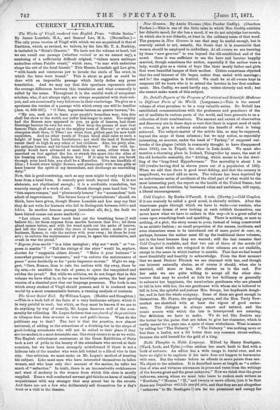Cold Comfort. By Burke O'Farrell. 3 vols. (Newby.)—Cold Comfort, if
it can scarcely be called a good novel, is cleverly written. After the- wearisome pages through which we have to wade—onr readers, who would never dream of ever looking at such rubbish themselves, can never know what we have to endure in this way—it is a great relief to, come upon something fresh and sparkling. There is nothing, or next to. nothing, of a plot; the story seems to grow, instead of being constructed in an artistic fashion ; no small proportion of the scenes, incidents, and even characters seem to be introduced out of mere gaiete de craw, or, perhaps, because the author must fill up the traditional three volumes,. not in the least because they are wanted ; still the fact remains that Cold Comfort is readable, and that two out of three of the novels (of those at least which are relegated to these columns are not readable, except in the sense in which leather is eatable. That fact we feel bound most thankfully and heartily to acknowledge. From the first moment that we meet Desirde Ffrench we are charmed with her, and though our interest naturally abates, as of course it should, when she in married, still more or less, she charms us to the end. Fer- ber sake we are quite willing to accept all the other cha- racters that may be needed as foils for her brilliancy or generally to subserve her happiness, the numberless gentlemen who are pleased to fall in love with her, the one gentleman with whom she is believed to fall in love, the spiteful and jealous Mrs. Scrope, her hoydenish daugh- ter, and in fact the whole company. Some of them are good enough in themselves. Mr. Payne, the sporting parson, and the Hon. Turfy New- market are sketched with at least the vigour of good carica- ture. The dialogue is always smart and natural, and the comic scenes with which the tale is interspersed are amusing. One ariticism we have to make. We do not like Desirde any the better for the.pains that are taken to give her character, which is really meant for a pure one, a spice of sham wickedness. What is meant- by calling her "The Dubarry "? "The Dubarry " was nothing more or less than a harlot, not a bit better than any common street-walker, because she sold herself for the gold of a king.


































 Previous page
Previous page